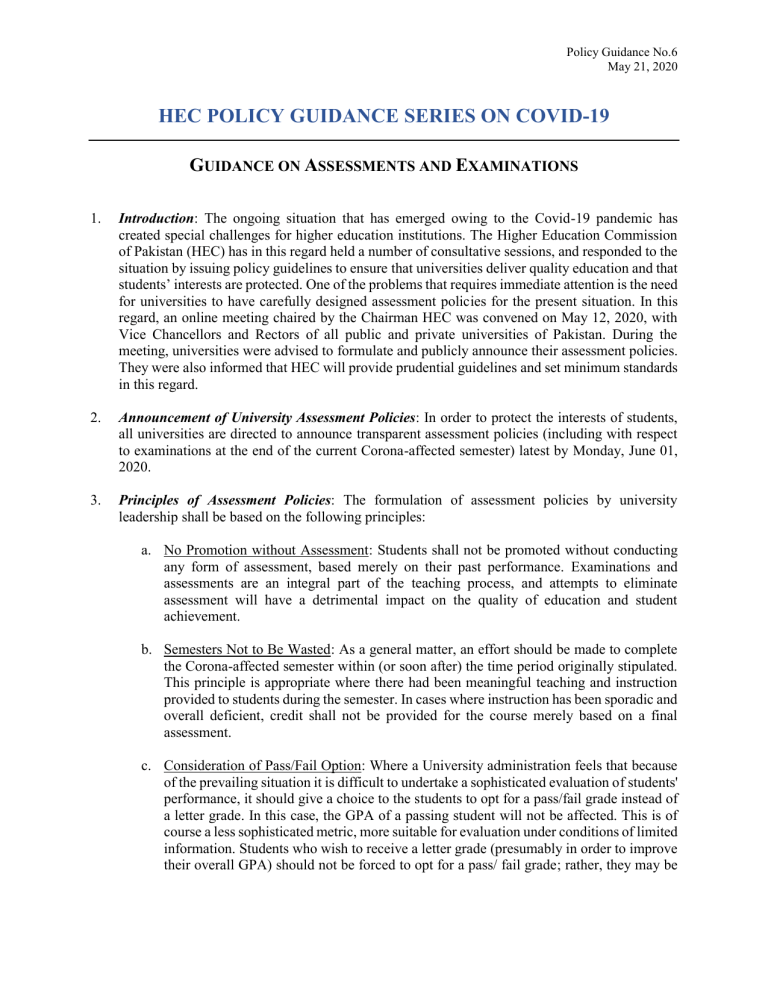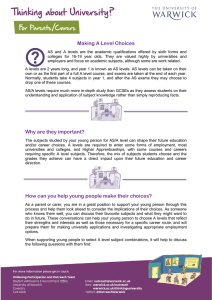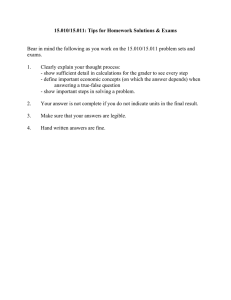
Policy Guidance No.6 May 21, 2020 HEC POLICY GUIDANCE SERIES ON COVID-19 GUIDANCE ON ASSESSMENTS AND EXAMINATIONS 1. Introduction: The ongoing situation that has emerged owing to the Covid-19 pandemic has created special challenges for higher education institutions. The Higher Education Commission of Pakistan (HEC) has in this regard held a number of consultative sessions, and responded to the situation by issuing policy guidelines to ensure that universities deliver quality education and that students’ interests are protected. One of the problems that requires immediate attention is the need for universities to have carefully designed assessment policies for the present situation. In this regard, an online meeting chaired by the Chairman HEC was convened on May 12, 2020, with Vice Chancellors and Rectors of all public and private universities of Pakistan. During the meeting, universities were advised to formulate and publicly announce their assessment policies. They were also informed that HEC will provide prudential guidelines and set minimum standards in this regard. 2. Announcement of University Assessment Policies: In order to protect the interests of students, all universities are directed to announce transparent assessment policies (including with respect to examinations at the end of the current Corona-affected semester) latest by Monday, June 01, 2020. 3. Principles of Assessment Policies: The formulation of assessment policies by university leadership shall be based on the following principles: a. No Promotion without Assessment: Students shall not be promoted without conducting any form of assessment, based merely on their past performance. Examinations and assessments are an integral part of the teaching process, and attempts to eliminate assessment will have a detrimental impact on the quality of education and student achievement. b. Semesters Not to Be Wasted: As a general matter, an effort should be made to complete the Corona-affected semester within (or soon after) the time period originally stipulated. This principle is appropriate where there had been meaningful teaching and instruction provided to students during the semester. In cases where instruction has been sporadic and overall deficient, credit shall not be provided for the course merely based on a final assessment. c. Consideration of Pass/Fail Option: Where a University administration feels that because of the prevailing situation it is difficult to undertake a sophisticated evaluation of students' performance, it should give a choice to the students to opt for a pass/fail grade instead of a letter grade. In this case, the GPA of a passing student will not be affected. This is of course a less sophisticated metric, more suitable for evaluation under conditions of limited information. Students who wish to receive a letter grade (presumably in order to improve their overall GPA) should not be forced to opt for a pass/ fail grade; rather, they may be Policy Guidance No.6 May 21, 2020 required to undertake additional testing to collect the information needed to assign a letter grade. d. Prevention of Cheating, Unpermitted Collaboration, and Plagiarism: These are problems even under normal circumstances, but may pose special challenges under the current context when students will be assessed without meaningful possibility of oversight or proctoring. The announced policy should be sensitive to this in two ways. First, an attempt should be made to forcefully reiterate to students the importance of academic honesty and the costs associated with engaging in dishonest conduct. Second, university leadership and faculty must ensure that the assessment methodologies employed are ones that do not encourage dishonest conduct (see Section 4 below for helpful guidelines in this regard). e. To the Extent Possible, Use the Same Method of Assessment for Students in a Course: This would be preferable to maintain fair standards and objectivity. However, as stated in Section 5(c) below, this may not always be possible owing to the unique situation faced by a student, in which case (under limited situations) this principle may be relaxed. f. Grievance Mechanism: The publicly announced assessment policy shall include a grievance mechanism for students who face special difficulties. While a focal person may be designated, at least a three-member committee (comprising at least one faculty member and one member of the senior administration) shall be constituted to consider the complaints. The policy shall clearly provide the mechanism to file a complaint with the committee, and stipulate a timeline (of no more than one week) to respond to such grievances. The HEC may also set up an appellate system to follow up on the complaints of students whose cases remain unresolved. 4. Approaches to Assessment: In terms of approaches to assessment, the present situation requires thinking beyond the conventional methods typically used in our universities. The most common method used is the closed-book examination, which no longer remains appropriate under the circumstances. Hence, depending on their capabilities and the type of course in question, universities shall have to quickly adapt and adopt other methods of assessment. It is noteworthy that some of the alternative forms of assessment may even be better than the traditional examinations in terms of evaluating students’ skills, knowledge and ability, and hence adopting these assessment styles (if done properly) may not reduce the quality of assessment. The following table presents possible approaches to assessment along with guidelines that should be kept in mind while prescribing a certain method. Universities may use any combination of the viable options, as long as they meet the minimum standards for readiness and have shared their policy publicly. 2 Policy Guidance No.6 May 21, 2020 Approach A How it Works Specific Considerations OPEN BOOK EXAMS The design of such exams is very different from the design of closed book tests. The underlying principle is that answering questions requires application of knowledge rather than recalling memorized information. While the test will be designed so that the student may access course materials (or possibly the web), special precautions will be needed to guard against (a) plagiarism and (b) unpermitted collaboration. Students must be warned against this. All students get the take-home openbook exam at the same time, and must submit it back within the normal time required to complete the exam (e.g. 2 hours) A2 Open Book Exam (Slot Within Timed Window) Students get the take-home open-book exam for a time window (e.g. 24 hours) and can take the test for the specified duration (e.g. 2 hours) at any time. Once the student starts the test, they must submit with the stipulated time period. A3 Open Book Exam (Timed Window) All students get the take-home openbook exam at the same time, and must submit it back within a stipulated time period (e.g. 24 hours). In contrast to option A1 above, this requires writing essays, reflections in response to specific prompts in a slightly longer time period etc. A1 Open Book Exam A suitable option, especially if delivered through an LMS (but can be sent/received over email). Technical issues can be a problem, if students don’t submit within the time period (no way of knowing whether a student took extra time or wasn’t able to submit within time). To guard against misuse, late exams should not generally be accepted after a certain time period has elapsed. Cannot be done without an LMS, which tracks when the student started the test. If a single test is made for all student, this is not encouraged since the test will likely get ‘leaked.’ Can guard against this risk by creating multiple question papers that are randomly sent to students. A viable option, can be delivered through LMS or email. Test questions for this option will test higher order skills, and application of knowledge (in essay-type format). The risk of plagiarism or unpermitted collaboration is higher compared to option A1. 3 Policy Guidance No.6 May 21, 2020 B B1 END OF SEMESTER WRITTEN WORK For certain disciplines, this may be preferable than exams. End-of-term papers are routinely the standard method of assessment for courses in certain disciplines in top universities of the world. This method may be optimal given current circumstances, where invigilated or proctored exams are not possible at this time. The greatest challenges with this model are (a) plagiarism, (b) unpermitted help or collaboration, such as asking others to write the assignments, and (c) weak research and writing skills. However, these risks are present even during normal times, and should not materially increase because of the student being at home. Research Paper Students are asked to write research papers on specific areas covered in the course, normally involving original research using materials other than prescribed in the course. B2 B3 Annotated Anthology, Bibliography, or Literature Review Reports, Memos, OpEd Style Articles Instead of writing a research paper, students are asked to prepare a annotated bibliography or literature review on an assigned or approved problem or topic. They will be required to read the works, evaluate them and their usefulness to the topic, and provide an explanatory / evaluative paragraph for each work in their own words and a comparison of the viewpoints. Involves active thinking, as these are normally written with an intended audience in mind. This method allows an opportunity to synthesize and apply course knowledge and skills. Can be a cumulative exercise, drawing on a large part of material covered in the semester (or a specific area or topic). A viable method of assessment in the current context, especially for social sciences, humanities, law, business studies, etc. (but also potentially for a many science courses). Challenge is access to research materials (from library or online access to databases), but scope could be limited to open access materials. Can be a more objective exercise, and more suited for students who have not written research papers before. Can be a guard against unpermitted collaboration, since if students choose a similar topic and cite the same sources, this will be detected. Focus here is less on narrative or writing style, and more on analysis (hence may be suitable for science subjects as well). A more creative exercise, which can be helpful for certain disciplines / courses. Some protection against plagiarism (since expression of views and opinions needed) and unpermitted collaboration (since original thinking is required, students who copy each other’s’ works will be detected). 4 Policy Guidance No.6 May 21, 2020 B4 Reflection Paper Students may be asked to write a reflection paper that discusses their perspective and intellectual path during the course. This provides an insight into their understanding and involvement in the course. C ORAL EXAMS AND PRESENTATIONS C1 Class Presentations To be conducted over videoconferencing platforms, students may be asked to give course presentations (e.g. for 10 minutes each, followed by a few questions from faculty and other students). Presentations may be based on displayed (or circulated) slides, but can also be oral presentations without slide decks. C2 One-on-One Oral Exams Can be scheduled over a videoconference platform. A timetable can be announced, where each student logs into the platform with the faculty member for a defined time-slot (e.g. 15-20 minutes). Can be done as a final assessment (for certain types of courses that are more theoretical in orientation), or an additional exercise along with open-book tests. The chance for plagiarism or unpermitted collaboration with peers is smaller here (since it requires expression of one’s own views), but not entirely absent. A highly effective method for large number of disciplines / courses, but requires excellent connectivity and access to videoconference platforms for the faculty and at least a majority of the students in the class. The advantage is that this will be interactive and live, so that the student will certainly have to know what he or she is presenting (even if unpermitted help was received in preparation for the session, they will have to actually present and answer questions). Risks of plagiarism minimized. An effective method provided excellent connectivity and access to video-conference platforms. A problem can arise if faculty give some students unduly difficult questions (or in case of bias, claim that the student failed to answer anything properly). To guard against this, the sessions should ideally be recorded. The same questions should not be asked of each student, since they will likely share their oral exam experience with their peers. In limited circumstances, when no other methods seem feasible, faculty may also conduct the oral 5 Policy Guidance No.6 May 21, 2020 exam over the phone or WhatsApp. However, these sessions should also be recorded to (a) make sure the sessions did take place (b) to have a record in case a student is treated unfairly. C3 Audiovisual Presentations The student may be allowed to submit recorded material (audio/video presentation) to be assessed by the faculty member. D In case connectivity is not sound for live communication, students may create audio-visual materials and submit to faculty for evaluation. Has the advantage that there will be record of submissions by default. As with live presentations, the student making the material will have to at least know what he or she presented. The downside is that they cannot be asked questions (as in a live session), so the extent of their knowledge of effort cannot be fully ascertained. This can be mitigated by having a follow-up oral exam. DISCOURAGED METHODS (NOT GENERALLY VIABLE UNDER PRESENT CONDITIONS) D1 Closed Book Exams Tests that would normally be administered under proctored conditions (i.e. containing questions that can easily be answered by consulting course materials or peers, and for which there would be no way to ascertain whether the student answered from his or her own mind or by cheating) Sending students tests designed for a closed-book format is highly discouraged (without a mechanism for invigilation or proctoring). There are now some e-Proctoring tools available online, but these technologies are both expensive and at a nascent stage (advanced universities may consider these for certain high-stakes exams) In cases in which none of the above alternatives are suitable for certain high-stakes exams, it may be better to wait until the lockdown restrictions are eased (but this should not generally apply to the larger proportion of courses). 6 Policy Guidance No.6 May 21, 2020 D2 Multiple Choice Questions 5. MCQs administered in traditional MCQs would be suitable only under manner without sophisticated LMS limited conditions at this time: platforms (e.g. by circulating the full If delivered through an LMS that set of questions to students by email) randomly generates question sequence, and shows only one question at a time (without the possibility of going back). If this is a highly timed activity, with all students concurrently answering the MCQs (without giving time to students to collaborate) If this is done in the traditional way (e.g. by handing over the entire question set), students will collaborate and there would be no way of ascertaining whether a student cheated or knew the material. Special Concerns and Situations: In designing assessment policies, university leadership must be mindful of the following special concern and situations. a. Final Year Students: A special emphasis should be placed on ensuring that final year students are able to graduate without losing significant time. b. Science, Technology, Engineering, Mathematics (STEM) Students: There are certain special challenges with respect to assessment for STEM subjects, as follows: i. Certain courses have lab requirements which cannot be fulfilled at this time. The university leadership shall work with the departments in coming up with sophisticated policy in this regard. For introductory-level courses, it may be possible to assign written work in lieu of the lab requirement. For higher-level courses where this would not be advisable, the university should explore options such as (a) completion of lab requirements after easing of lock-down and to be fulfilled under conditions of social distancing, (b) shifting the lab requirement, if possible, to the next semester, or (c) other options depending on type of course. ii. Writing STEM exam answers can often be difficult using a keyboard, if symbols, diagrams, charts, graphs etc. are required. To the extent possible, the exam should be designed so that it can be answered using a computer. If this is not possible, then either (a) the student can scan and send their answer sheet or (b) given scanners are not readily available, can take photos (or use smart phone apps) and send them using their phones or email to the faculty member. iii. It can be a bit more difficult to create open-book tests for STEM subjects where there is an objective right answer (and given there are computation tools now available over the internet). There are, however, ways to mitigate this problem, 7 Policy Guidance No.6 May 21, 2020 such as by asking more conceptual questions (with word problems rather than simple computations), asking students to identify errors in a computation (this can’t be done over google) etc. c. Students with Limited or No Connectivity: The policy should accommodate such students, with some degree of diligence to make sure that the case is genuine. For those with no internet connectivity, oral exams may be taken over the phone (if available). Further, it is permissible that while those with connectivity be examined using a certain method, such students lacking connectivity may be examined using a method more suitable to their situation. d. Students Facing Medical Difficulties: This policy should also accommodate such students who face medical difficulties or other problems. Any exemptions granted here should be limited, and approval must be obtained by senior university management. e. Thesis Defense: The HEC has issued a separate policy notification regarding thesis / dissertation defense during the lockdown period. This policy can be accessed on the HEC’s website @ https://www.hec.gov.pk/english/HECAnnouncements/Documents/nCoVirus/PhDMPhil-MSDefense-Final-Juries.pdf. 8



